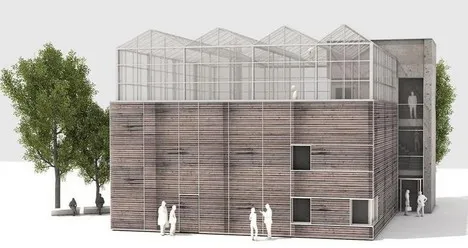In the coming months and years, a research team at Osnabrück University of Applied Sciences wants to establish a highly innovative network of science and industry under the name "AgrarCycle" in order to sustainably promote vertical agriculture in Germany. The project is being funded with more than 120,000 euros from the Innovation Programme for SMEs (ZIM) of the Federal Ministry of Economics and Energy.
In vertical farming, vegetables and fruit are grown in multi-storey buildings. This system requires neither direct sunlight nor arable land, as the plants grow in nutrient solutions under artificial light or daylight. In addition to efficient land use at altitude, food can be produced in an Indoor Vertical Farm (IVF) in a reliable, weather-independent way. In addition, the use of pesticides can be largely dispensed with when producing in closed and controllable agricultural systems of an IVF. "This will make it possible to supply people in urban areas with regionally produced food in the future," says Prof. Dr. Andreas Ulbrich, Professor of Vegetable Production and Processing.
 In October last year, the Osnabrück University of Applied Sciences was able to announce that a new research centre "Agricultural Systems of the Future" will be established on the Haste Campus. The expertise from the research centre will also flow into the ZIM network "AgrarCycle". Graphic: Hüdepohl.Ferner Architektur- und Ingenieurges.
In October last year, the Osnabrück University of Applied Sciences was able to announce that a new research centre "Agricultural Systems of the Future" will be established on the Haste Campus. The expertise from the research centre will also flow into the ZIM network "AgrarCycle". Graphic: Hüdepohl.Ferner Architektur- und Ingenieurges.
Further project partners are welcome
Food from a vertical indoor farm is still too expensive, partly because of the higher electricity consumption. The project application states, for example: "Apart from other costs, the energy requirement of 7 kWh per kilogram of lettuce means that the costs are already over one euro. In order to significantly reduce production costs, innovative electronics are specifically lacking. With the help of the ZIM network, this should change. "Together with the various project partners, we want to find ways to reduce emissions and use resources more efficiently," explains Prof. Dr. Hans-Jürgen Pfisterer, Professor of Electrical Drives and Installations. "We want to meet the requirements of nutrition- and health-conscious consumer groups and bring new plant-based product innovations to market," adds Ulbrich.
This is to be achieved both with partners who contribute financially to the network and with associated partners who provide non-material support to the network. The time for the project seems to be favourable in many respects: In July of last year, the Faculty of Agricultural Sciences at the University of Göttingen published a study which concluded that every second consumer would buy products from vertical farming.
More project partners from within science and industry are being sought for the "AgrarCycle" network. "The vision of the ZIM network "AgrarCycle" is the further development of closed and controllable agricultural systems with all components and stakeholders along the entire agri-food value chain, so that climate-resilient, efficient, quality-oriented and economic production can take place in them, and energy and material cycles can be optimised and closed," says the project proposal.
Source: HS Osnabrück
